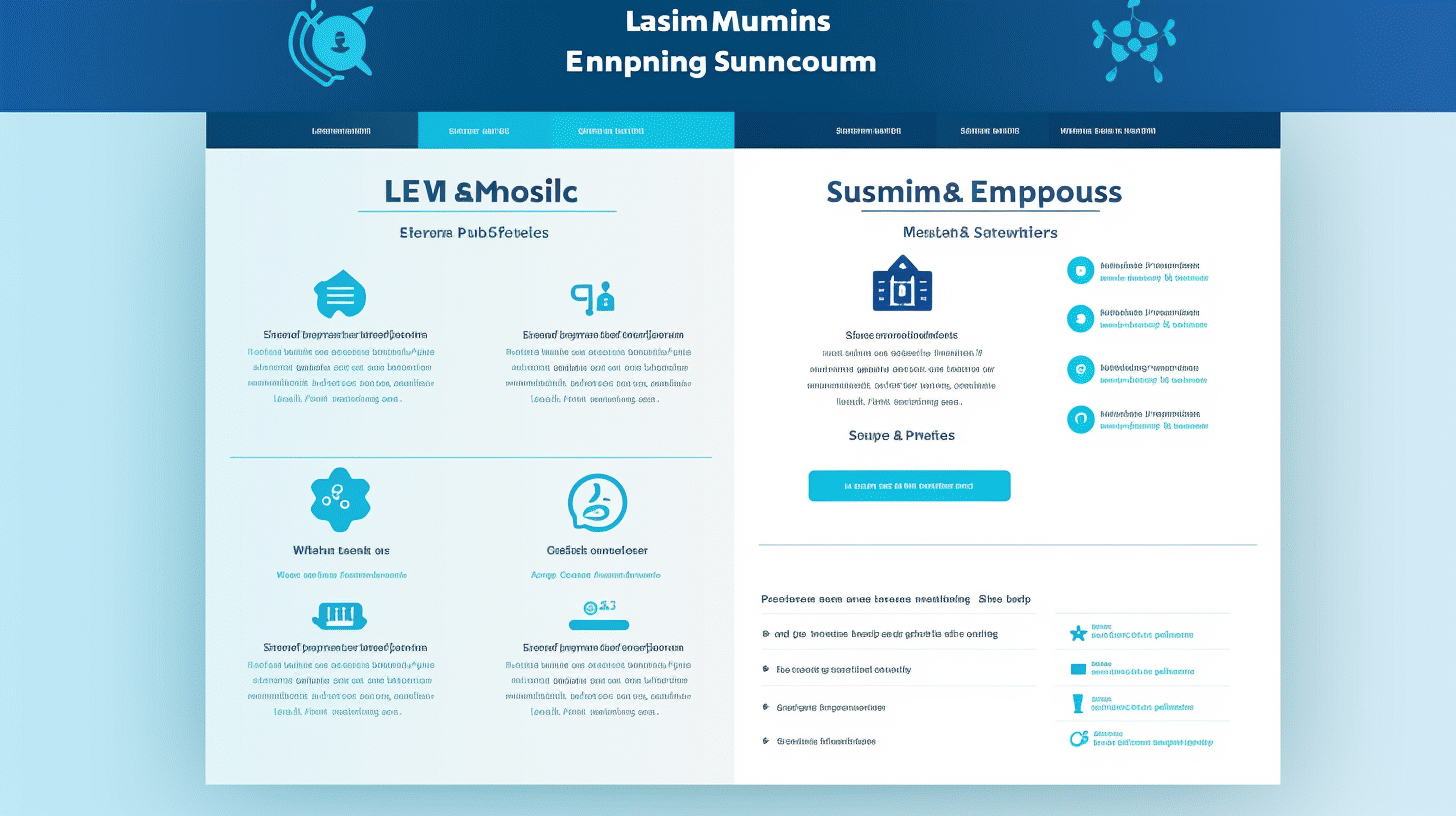您是否希望使用 WordPress 建立線上課程或會員網站?隨著電子學習越來越受歡迎,選擇適合您需求的正確學習管理系統 (LMS) 外掛程式至關重要。 WordPress 提供各種各樣的 LMS 插件,每個插件都有自己獨特的功能和能力。然而,在眾多選項中尋找方向可能會讓人不知所措。
在此 WordPress LMS 比較指南中,我們將深入研究適用於 WordPress 的頂級 LMS 插件,並分析其主要功能、易用性、課程和會員資格創建功能、自訂選項和使用者體驗。在本指南結束時,您將全面了解領先的 WordPress LMS 插件,從而為您的線上教育事業做出明智的決定。
因此,無論您是希望創建和銷售課程的教育工作者、旨在培訓員工的企業主,還是熱衷於教學的個人,本指南都將為您提供知識,以釋放您的線上學習平台的潛力。讓我們開始吧!
頂級 WordPress LMS 插件
在線上學習領域,擁有可靠且功能豐富的學習管理系統 (LMS) 是提供有效課程和吸引受眾的關鍵。 WordPress 是最受歡迎的內容管理系統之一,它提供了各種各樣的 LMS 插件,可以幫助您創建、管理和銷售線上課程。
在這裡,我們將探討當今市場上的一些頂級 WordPress LMS 插件,每個插件都有自己獨特的功能和優勢。無論您是教育工作者、培訓師還是希望透過自己的專業知識賺錢的企業主,這些外掛程式都可以改變您的線上學習之旅。
Sensei LMS
Sensei LMS 是一款功能強大的插件,可與 WordPress 無縫集成,成為許多教育工作者和企業的首選。使用 Sensei,您可以輕鬆建立和管理線上課程。 Sensei LMS 的一些主要功能包括:
- 使用者友好的課程創建介面。
- 透過測驗和評估來測試學習者的知識。
- 詳細的報告和分析來追蹤學習者的進度。
- WooCommerce 整合用於銷售課程和管理付款。
升降機學習管理系統
LifterLMS 是另一個流行的 WordPress LMS 插件,以其用戶友好的介面和廣泛的自訂選項而聞名。無論您是建立簡單的課程還是實施會員網站,LifterLMS 都能滿足您的需求。以下是 LifterLMS 的一些顯著特徵:
- 拖放式課程建立器,輕鬆建立課程。
- 會員網站具有創建獨家內容的功能。
- 強大的參與功能,如遊戲化和成就徽章。
- 強大的報告和分析功能,用於追蹤學習者的表現。
會員新聞
MemberPress 是一款適合初學者的 LMS 插件,專為創建具有視覺吸引力的線上課程而設計。使用 MemberPress,您可以輕鬆建立會員網站並提供不同程度的內容存取權限。 MemberPress 的主要功能包括:
- 簡單的課程創建過程,具有可自訂的佈局。
- 滴灌內容功能,用於交錯課程發布。
- 輕鬆與 WooCommerce 和 LearnDash 等流行插件整合。
- 為銷售您的課程和會員資格提供靈活的定價選擇。
這些只是可用的幾個頂級 WordPress LMS 外掛。要發現更多選項並深入比較這些插件,您可以查看此綜合指南 掌握 WordPress LMS.
請記住,在選擇 LMS 外掛程式時,請考慮您的特定要求、預算和技術專長。每個插件都有其自身的優點和局限性,因此評估哪一個最符合您的線上教學目標至關重要。
🌟 不要錯過切實的成果! 🌟
現在您已經了解了一些頂級 WordPress LMS 插件,是時候深入了解並找到最適合您的電子學習需求的插件了。利用科技的力量,以吸引學習者並推動成功的方式提供有影響力的課程。
WordPress LMS 外掛程式的比較因素
您是否希望使用 WordPress 建立和管理線上學習平台?由於有如此多的 WordPress LMS 外掛程式可用,因此找到適合您需求的外掛程式可能會很困難。為了幫助您做出明智的決定,我們將探討 WordPress LMS 外掛程式的一些關鍵比較因素。讓我們開始吧!
功能集
在評估 WordPress LMS 外掛時,考慮它們提供的功能集至關重要。以下是需要尋找的一些重要特徵:
- 課程管理:外掛程式應提供用於創建、組織和管理課程的強大工具。
- 會員管理:尋找提供會員功能的插件,讓您控制對特定課程或內容的存取。
- 評估和評分:考慮提供評估工具(例如測驗和作業)以及評分和報告功能的插件。
- 內容傳遞:確保外掛程式支援各種內容格式,包括影片、互動課程、PDF 等。
- 遊戲化:一些外掛程式提供徽章、排行榜和積分等遊戲化功能,以增強學習者的參與度。
請記住,每個外掛程式可能都有自己獨特的功能集,因此請優先考慮符合您特定要求的功能。
易於使用
使用者友善的介面對於您(作為課程創建者)和您的學習者都至關重要。在評估不同 WordPress LMS 外掛的易用性時需要考慮以下一些因素:
- 直覺的課程創建:尋找提供簡單課程創建過程的插件,讓您輕鬆添加課程、測驗和其他學習組件。
- 使用者友善的學習者介面:考慮提供乾淨直覺的介面供學習者瀏覽課程和存取學習材料的插件。
- 管理控制:確保外掛程式提供易於使用的管理儀表板,其中包含用於管理課程、會員資格和使用者資料的簡單控制。
請記住,從長遠來看,一個易於設定和管理的插件將節省您的時間和精力。
課程和會員資格創建
創建和組織課程的過程對於提供有效的線上學習體驗起著至關重要的作用。以下是評估課程和會員資格創建能力時需要考慮的一些因素:
- 課程結構:尋找允許您建立包含模組、課程和主題的邏輯課程結構的外掛程式。
- 內容靈活性:考慮支援各種內容格式的插件,讓您將多媒體元素和互動活動納入您的課程。
- 會員級別:如果您打算提供具有不同存取權限的不同會員級別,請確保外掛程式允許輕鬆建立和管理會員等級。
客製化課程內容和會員選項的能力將幫助您根據您的獨特需求客製化線上學習平台。
自訂選項
每個線上學習平台都有自己的品牌和設計要求。以下是在評估 WordPress LMS 外掛時需要考慮的一些自訂選項:
- 主題相容性:確保外掛程式與您選擇的 WordPress 主題無縫協作或提供自己的可自訂主題選項。
- 樣式選項:考慮提供顏色、字體、佈局和其他視覺元素自訂功能的外掛程式。
- 品牌推廣機會:尋找允許您添加自己的徽標、網站圖標和其他品牌資產的插件,以保持一致的品牌形象。
插件提供的自訂選項越多,創建視覺吸引力強且有凝聚力的學習環境就越容易。
使用者體驗
最後但同樣重要的一點是,使用者體驗是選擇 WordPress LMS 外掛時的關鍵因素。以下是需要考慮的事項:
- 響應式設計:確保插件適合行動設備,並在不同設備上提供無縫的學習體驗。
- 進度追蹤:尋找允許學習者追蹤他們的進度、查看已完成的課程以及從上次中斷的地方繼續學習的插件。
- 通訊工具:考慮提供論壇、私人訊息或其他通訊管道的插件,以促進學習者之間的協作和互動。
積極的使用者體驗將提高學習者的參與度和滿意度,從而帶來更好的學習成果。
請記得花時間根據這些比較因素徹底評估每個 WordPress LMS 外掛。選擇符合您的特定需求和目標的插件非常重要。快樂探索!
領先的 WordPress LMS 外掛的詳細分析
近年來,線上教育領域出現了顯著的繁榮。這導致 WordPress 學習管理系統 (LMS) 外掛程式的流行度上升,為創建和管理線上課程提供了一個無縫的平台。由於有大量的選項可供選擇,選擇適合您需求的 LMS 插件可能會很困難。
在本文中,我們將深入探討領先的 WordPress LMS 外掛程式的細節,研究它們的功能、易用性、定價和客戶評論。最後,您將全面了解每個插件,從而為您的線上課程平台做出明智的決定。
Sensei LMS
Sensei LMS 是一個強大的插件,由 WordPress 本身的創建者 Automattic 開發。 Sensei LMS 具有使用者友善的介面和廣泛的功能,簡化了課程創建和管理的過程。讓我們仔細看看 Sensei LMS 的獨特之處:
- 直覺的課程建構器:Sensei LMS 提供使用者友善的課程建立器,讓您能夠輕鬆組織內容。您可以輕鬆建立課程、模組和測驗,並根據需要重新排列它們。
- 靈活的定價選項:無論您想提供免費課程、付費課程或兩者結合,Sensei LMS 都能提供靈活的定價選項。您可以對單獨的課程收費,也可以向學生提供捆綁套餐。
- 無縫集成:Sensei LMS 與其他流行的 WordPress 外掛程式無縫集成,例如 WooCommerce 和 Mailchimp。這使您可以透過電子商務功能增強您的課程平台並輕鬆管理您的學生電子郵件清單。
- 有趣的測驗和評分:Sensei LMS 提供多種測驗選項,包括多項選擇題、判斷題和開放式問題。您可以建立有趣的測驗來評估學生的理解程度,甚至設定自動評估的評分標準。
根據客戶評論,Sensei LMS 因其用戶友好的介面和豐富的文件而受到高度讚譽。然而,一些用戶在使用高級自訂選項時遇到了限制。總的來說,Sensei LMS 是一款功能強大且可靠的 WordPress LMS 插件,可滿足初學者和高級用戶的需求。
請繼續關注,我們將探索更多領先的 WordPress LMS 插件,包括 LifterLMS、MemberPress、LearnDash、Tutor LMS、Masteriyo、LearnPress、WP Courseware 和 Thrive Apprentice,以幫助您為線上課程平台做出明智的選擇。
顧客評論和體驗
在網上購物的世界中,客戶評論和體驗起著至關重要的作用。在購買產品或服務之前,許多消費者會查看客戶評論來判斷其品質和有效性。這些評論提供了已經嘗試和測試過該產品的真實用戶的寶貴見解和回饋。結合個人插件使用者的評論和體驗可以增強整體購物體驗,並為潛在買家提供全面的概述。
以下是客戶評論和體驗很重要的幾個原因:
- 信譽與信任: 顧客評論增加了產品或服務的可信度。當潛在買家看到滿意客戶的正面評價時,他們就會相信產品或服務是可靠且值得信賴的。另一方面,如果有負面評論或投訴,這將是一個警告信號,讓潛在買家重新考慮他們的購買。
- 真實世界的回饋: 客戶評論提供真實的回饋和對產品或服務在不同場景下的表現的見解。這些評論通常包括有關產品的功能、易用性、耐用性和其他重要因素的具體細節。透過閱讀其他顧客的體驗,潛在買家可以更了解產品是否能滿足他們的需求或期望。
- 產品改進: 客戶評論為企業改進其產品或服務提供了寶貴的回饋。透過分析客戶回饋並找出常見的痛點或需要改進的領域,公司可以做出必要的調整以增強整體客戶體驗。這種持續改進的循環對企業和消費者都有好處。
- 比較分析: 客戶評論還可以讓潛在買家比較類似的產品或服務。透過閱讀不同選項的評論,客戶可以評估每個選項的優缺點並做出明智的決定。這種比較分析有助於客戶選擇最適合其要求和偏好的產品。
- 社區參與: 客戶評論可以培養買家之間的社區意識。個人可以在評論區或論壇上分享他們的經驗、提出問題並與其他使用者互動。這種合作為客戶創造了一個寶貴的平台,使他們能夠互相聯繫、分享知識並幫助彼此做出明智的決策。
將顧客評論和體驗融入購物過程對於企業和消費者來說是雙贏的。公司可以展示他們收到的正面回饋,提升他們的聲譽並吸引潛在買家。同時,消費者可以依靠這些評論做出明智的決定並獲得更好的整體購物體驗。
請記住,當考慮購買產品或服務時,請花時間閱讀客戶評論和體驗。他們提供寶貴的見解,可以幫助您做出明智的決定並確保您對購買感到滿意。祝您購物愉快! ✨🛍️
結論
在探索了頂級 WordPress LMS 外掛程式並分析了其功能、易用性、課程和會員資格創建選項、自訂選項和用戶體驗之後,很明顯,LMS 外掛程式的選擇取決於個人需求和偏好。每個插件都提供其獨特的功能和優點,因此在做出決定之前必須考慮預算、可擴展性和特定要求等因素。
雖然 Sensei LMS、LifterLMS、LearnDash 和 Tutor LMS 是講師和課程創建者的熱門選擇,但 MemberPress、Masteriyo、LearnPress、WP Courseware 和 Thrive Apprentice 也為建立和管理線上課程提供了強大的選項。
最終,最適合您的 WordPress LMS 外掛程式將取決於您的特定需求和目標。無論您優先考慮用戶友好的介面、廣泛的自訂選項還是全面的功能集,都有一個插件可以滿足您的要求。
對於那些希望將他們的 WordPress 網站提升到新水平的人來說,Managed-WP™ 提供了一個優質的託管 WordPress 雲端託管平台。 Managed-WP™ 憑藉簡化的基礎設施、自由的數位體驗以及專家的 24/7/365 問題解決方案,確保您的網站得到妥善管理。體驗 Managed-WP™ 的強大功能並釋放您的 WordPress 網站的真正潛力。 了解更多 了解 Managed-WP™ 並立即開始最大化您的線上影響力。
常見問題解答
- 有哪些頂級的 WordPress LMS 外掛程式可用?
一些頂級的 WordPress LMS 外掛是 LearnDash、LifterLMS、Sensei、Tutor LMS 和 LearnPress。
- 如何選擇適合我需求的 WordPress LMS 外掛?
在選擇適合您需求和目標的 WordPress LMS 外掛程式時,請考慮您的預算、所需功能、易用性、整合選項、客戶支援和用戶評論等因素。
- LMS 外掛可以與任何 WordPress 主題一起使用嗎?
大多數 LMS 外掛程式都設計為與任何編碼良好的 WordPress 主題相容。但是,始終建議在做出最終決定之前檢查 LMS 外掛程式與您選擇的主題的兼容性。
- 我可以使用 WordPress LMS 外掛程式建立線上課程嗎?
是的,LearnDash、LifterLMS 等 WordPress LMS 外掛提供了強大的課程創建和管理功能,可讓您輕鬆地在 WordPress 網站上建立和銷售線上課程。
- WordPress LMS 外掛程式是否適合初學者?
許多 WordPress LMS 外掛程式提供使用者友好的介面和豐富的文件來幫助初學者入門。但是,有些插件可能有更陡峭的學習曲線,因此選擇適合您的技術經驗等級的插件非常重要。



















